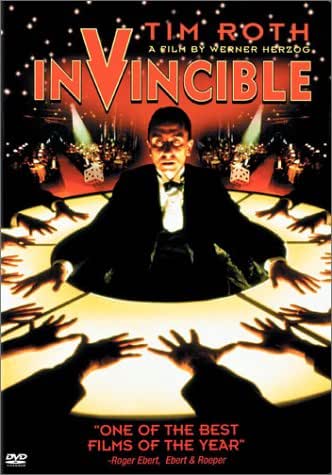***/**** Image A Sound A+
starring Tim Roth, Jouko Ahola, Anna Gourari, Jacob Wein
written and directed by Werner Herzog
by Walter Chaw With casting, in true Herzog fashion, being the lion’s portion of performance, Finnish strongman Jouka Ahola starring as legendary Jewish strongman Zishe Breitbart in Herzog’s Invincible is a stroke of inspired madness. Herzog fashions Ahola’s total lack of experience and guile into something like an ecstatic holiness. He’s done this before, of course, with madmen Bruno S. in The Enigma of Kaspar Hauser and Stroszek and the certifiable Klaus Kinski in some five astonishing pictures (astonishing not only for their quality, but also for the fact that there were five), so although extratextual complexity ever-threatens to become a distraction in Herzog’s films, it’s the sort of distraction that edifies Herzog’s preoccupation with blurring the distinction between performance and naturalism, fiction and documentary. No less so than in Invincible: The first time Herzog has returned to the pre-Bellum Nazi period in Germany since his directorial debut, Signs of Life, it pits one of Herzog’s classic social naïfs against a creature of pure manipulative malevolence, Hanussen (Tim Roth), who is, naturally, the kind of master showman/entertainer Herzog has always mistrusted.
Hanussen is angling to be the secretary of the Occult in the ascendant Third Reich, and the way that Herzog stages his burlesque show (it occupies a good third of the picture) is itself an illusion malevolent and compelling. Roth is exceptional, his greasy wiliness at perfect loggerheads with Ahola’s lunkheaded purity–qualities in tension against one another, provided an extra level of damnedness by Herzog’s own obvious mastery of visual storytelling. The director is firmly of Hanussen’s part: consider how a dream sequence in which a mass migration of crabs insensate across a train track, engine looming, recalls the rising tide of Nazi red while making of the train a dual premonition of the Holocaust and the eventual, self-destructive automatism of Hitler’s military bureaucracy. It’s the efficiency of wordless passages like this that make so much of the rest of Invincible something of an ordeal. For as well-cast as Ahola is, when given long passages of dialogue, he starts to remind–and not in a good way–of Andre the Giant in The Princess Bride. And the entire first half as Zishe is trekking to Berlin (he wants to be the “new Siegfried” for his Aryan admirers before declaring himself the “new Samson”) is remarkable mainly for one scene in a moviehouse where he is introduced to not just the marvels of modernity, but the means of representation to which he will become both perpetrator and slave, too.
THE DVDNew Line ushers Invincible home in a DVD presentation that, at least in terms of technical achievement, exceeds expectation. The 1.85:1 anamorphic widescreen transfer is simply glorious, rendering the squalor of Zishe’s ghetto with as much texture as Hanussen’s eye-splitting study and the mad circus of Zishe’s stage debut. The scene in the cinema is alive with motes and shafts of light–it’s near-showcase material matched by tremendous Dolby Digital 5.1 audio and an even better DTS option. Rafters-shaking yet distinct and precise, the DTS track is a first for a title in Herzog’s library, though the filmmaker’s expertise with all aspects of motion picture technology makes the marriage a logical one. Turn to Hanussen’s stage show again for a demonstration of the full range and fidelity of the mix. Aside from a theatrical trailer plus trailers for S1m0ne, Shine, and Tumbleweeds, there are no extras on this disc, a somewhat glaring omission given Herzog’s friendliness with the medium.
135 minutes; PG-13; 1.85:1 (16×9-enhanced); English DD 5.1, English DTS 5.1, English Dolby Surround; CC; English subtitles; DVD-9; Region-free; New Line




![Wolf Creek (2005) [Widescreen Edition - Unrated Version] - DVD + Hostel (2006) [Unrated Widescreen Cut] - DVD|[Director's Cut] - Blu-ray Disc 6a0168ea36d6b2970c017ee3fa7823970d](https://i0.wp.com/filmfreakcentral.net/wp-content/uploads/6a0168ea36d6b2970c017ee3fa7823970d.jpg?resize=150%2C150&ssl=1)
![The Lion King (1994) [Platinum Edition] - DVD|[Diamond Edition] - Blu-ray Disc 6a0168ea36d6b2970c019affbdca37970b-600wi](https://i0.wp.com/filmfreakcentral.net/wp-content/uploads/6a0168ea36d6b2970c019affbdca37970b-600wi.jpg?resize=150%2C150&ssl=1)